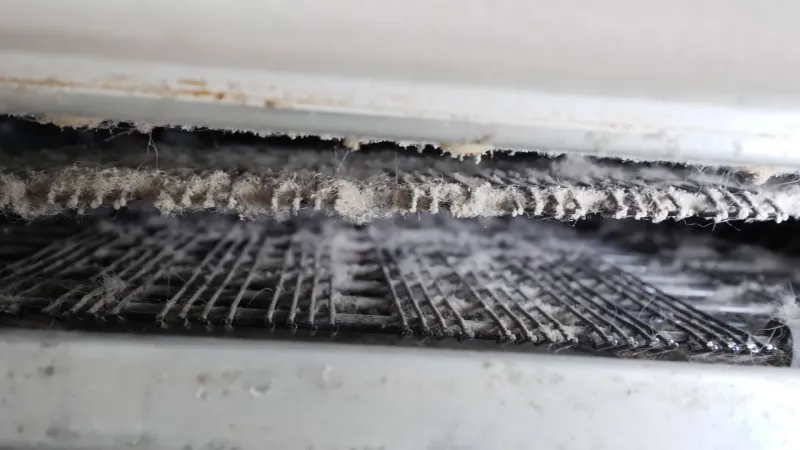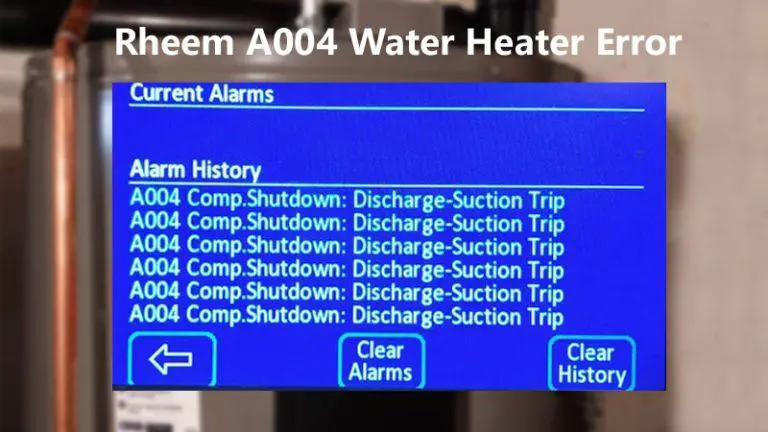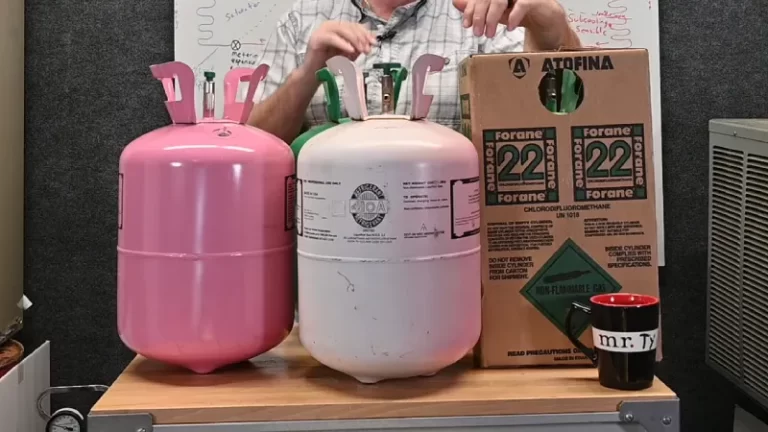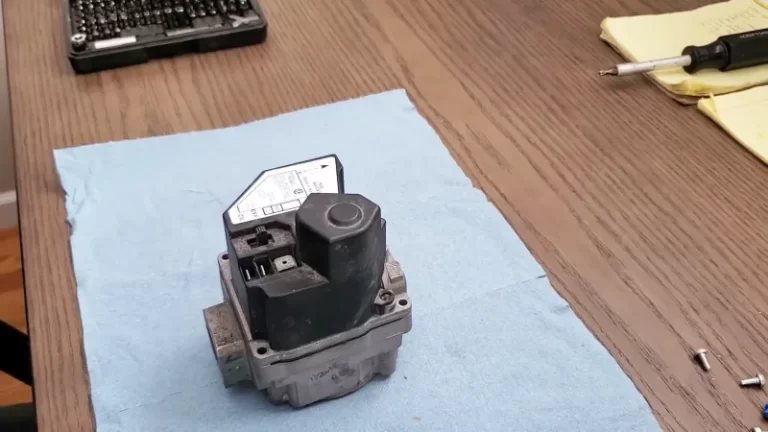How Often to Clean Air Conditioner Coils?
Air conditioner coils play a vital role in the cooling process, as they transfer heat from the indoor air to the outside. However, over time, these coils can become clogged with dirt, dust, and other debris, hindering their ability to function properly.
Regular cleaning of air conditioner coils is essential to ensure that your air conditioning unit operates at peak efficiency and to prevent issues such as decreased cooling performance, increased energy consumption, and system failure.
In this article, we’ll discuss how often you should clean your air conditioner coils and why it’s so important to make regular maintenance a priority.
You'll Learn About
How Often to Clean Air Conditioner Coils?
The frequency at which you need to clean your air conditioner coils depends on a variety of factors, such as how often you use your unit, the environment in which you live, and the type of air conditioner you have. In general, it is recommended to clean your air conditioner coils at least once a year, ideally before the start of the cooling season.
If you live in an area with high levels of air pollution or if your air conditioner is located in a particularly dusty or dirty environment, you may need to clean your coils more frequently. Similarly, if you use your air conditioner heavily during the summer months, you may want to consider cleaning your coils more often to keep your unit operating at peak efficiency.
It’s also important to note that neglecting to clean your air conditioner coils can lead to a variety of problems, including decreased cooling performance, increased energy consumption, and even system failure. Regular cleaning can help prevent these issues and extend the lifespan of your air conditioning unit.
In summary, while the exact frequency at which you need to clean your air conditioner coils may vary, it’s generally recommended to do so at least once a year. By keeping your coils clean and well-maintained, you can ensure that your air conditioning unit operates efficiently and effectively for years to come.

Factors That Affect Cleaning Frequency
Several factors can affect how often you need to clean your air conditioner coils. In this section, we’ll discuss some of the most significant factors that you should consider when determining how frequently to clean your coils.
Frequency of Ac Use
The frequency of AC use can have a significant impact on how often you need to clean your air conditioner coils. If you use your air conditioner frequently, the coils are likely to accumulate dirt and debris more quickly, leading to a decrease in performance. As a general rule, it’s recommended to clean your coils at least once a year, but if you use your air conditioner heavily, you may need to clean them more often.
Environment and Air Quality
The environment in which you live can also impact how often you need to clean your air conditioner coils. If you live in an area with high levels of air pollution or dust, your coils are likely to get dirty more quickly. Similarly, if your air conditioner is located in a particularly dusty or dirty environment, such as a construction site or a garage, you may need to clean your coils more frequently.
Type of Air Conditioner
Different types of air conditioners may require different cleaning frequencies. For example, a central air conditioning system with an outdoor unit will likely need more frequent cleaning than a window unit. Ductless mini-split air conditioners may also require more or less frequent cleaning, depending on their location and how often they are used.
Manufacturer’s Recommendations
Finally, it’s important to consider the manufacturer’s recommendations for cleaning and maintenance. Some air conditioner manufacturers may provide specific guidelines for how often you should clean the coils, based on the type of unit and its usage. Checking the manufacturer’s recommendations can be an excellent starting point when determining how often to clean your air conditioner coils.
In summary, several factors can impact how often you need to clean your air conditioner coils. By considering these factors and making regular maintenance a priority, you can ensure that your air conditioning unit operates efficiently and effectively for years to come.
Risks of Neglecting Air Conditioner Coil Cleaning
Neglecting to clean your air conditioner coils can lead to several risks that can impact the performance, efficiency, and longevity of your unit. In this section, we’ll discuss some of the most significant risks of neglecting air conditioner coil cleaning.
Decreased Cooling Performance
One of the most significant risks of neglecting air conditioner coil cleaning is decreased cooling performance. When your coils are dirty, they cannot efficiently transfer heat from the indoor air to the outside, resulting in decreased cooling capacity. This can lead to a less comfortable indoor environment and may require your air conditioner to work harder to achieve the desired temperature.
Increased Energy Consumption
When your air conditioner has to work harder to cool your home due to dirty coils, it can also result in increased energy consumption. This can lead to higher electricity bills, which can be a significant financial burden over time.
Risk of System Failure
Neglecting air conditioner coil cleaning can also increase the risk of system failure. Dirty coils can cause your air conditioner to overheat, which can lead to system failure and costly repairs. In severe cases, neglecting coil cleaning can even lead to the need for a complete system replacement.
Cost of Repairs and Replacements
Finally, neglecting air conditioner coil cleaning can lead to costly repairs and replacements. When your coils are dirty, it can cause other components of your air conditioning system to wear out more quickly, leading to the need for repairs or replacements. This can be a significant financial burden, and in some cases, it may be more cost-effective to replace the entire system.
In summary, neglecting air conditioner coil cleaning can lead to decreased cooling performance, increased energy consumption, the risk of system failure, and costly repairs and replacements. Regular maintenance, including coil cleaning, is essential to ensure that your air conditioning system operates efficiently and effectively for years to come.
Benefits of Regular Air Conditioner Coil Cleaning
Regular air conditioner coil cleaning is an essential aspect of maintaining the performance and longevity of your air conditioning system. In this section, we’ll discuss some of the significant benefits of regular air conditioner coil cleaning.
Improved Energy Efficiency
One of the most significant benefits of regular air conditioner coil cleaning is improved energy efficiency. When your air conditioner’s coils are dirty, they cannot efficiently transfer heat, resulting in the system working harder and using more energy to achieve the desired indoor temperature. Regular coil cleaning ensures that your air conditioner operates at optimal efficiency, resulting in lower energy bills and reduced environmental impact.
Better Air Quality
Dirty coils can also impact the air quality in your home. Dust, dirt, and other contaminants can accumulate on the coils, leading to decreased indoor air quality. Regular coil cleaning ensures that the air circulating through your air conditioner is clean, reducing the risk of respiratory issues, allergies, and other health problems.
Longer Lifespan of Air Conditioning Unit
Regular coil cleaning can also extend the lifespan of your air conditioning unit. When your coils are dirty, it can cause other components of your air conditioning system to work harder and wear out more quickly, leading to the need for costly repairs or replacements. By regularly cleaning your coils, you can prevent these issues and ensure that your system lasts for many years.
Cost Savings
Finally, regular air conditioner coil cleaning can result in cost savings over the long term. By improving energy efficiency, you can lower your energy bills, and by extending the lifespan of your air conditioning system, you can avoid the need for costly repairs or replacements.
In summary, regular air conditioner coil cleaning can result in improved energy efficiency, better air quality, a longer lifespan for your air conditioning unit, and cost savings. By making coil cleaning a part of your regular air conditioning maintenance routine, you can enjoy the many benefits of a well-maintained air conditioning system.
How Often to Clean Air Conditioner Coils
In this section, we’ll discuss general guidelines for how often you should clean your air conditioner coils, recommendations for specific situations, and signs that indicate when cleaning is needed.
General Guidelines for Cleaning Frequency:
The general recommendation for air conditioner coil cleaning is at least once a year. However, the frequency of cleaning may vary depending on several factors, including the frequency of AC use, environment and air quality, type of air conditioner, and manufacturer’s recommendations.
Frequency of Ac Use
The more often you use your air conditioning unit, the more frequently you’ll need to clean the coils. If you use your air conditioner daily during the summer months, it’s best to clean the coils every six months. If you use your AC less frequently, an annual cleaning may be sufficient.
Environment and Air Quality
If you live in an area with high humidity, dust, or pollution, you may need to clean your air conditioner coils more frequently. Dust and debris can accumulate on the coils, reducing the unit’s efficiency and leading to premature wear and tear.
Type of Air Conditioner
The type of air conditioner you have can also affect how often you need to clean the coils. Central air conditioning systems tend to accumulate dirt and debris more quickly than window or portable units. Ductless mini-split systems may also require more frequent cleaning because they have multiple indoor units.
Manufacturer’s Recommendations
It’s always a good idea to refer to the manufacturer’s recommendations for cleaning and maintenance. The manufacturer may have specific guidelines for your particular air conditioner model that you should follow.
Recommendations for Specific Situations:
In addition to the general guidelines, there are specific situations where you may need to clean your air conditioner coils more frequently. These include:
- If You Have Pets: Pet hair and dander can accumulate on the air conditioner coils, reducing efficiency and air quality. If you have pets, it’s best to clean the coils every three to four months.
- If you have allergies: If you or someone in your household has allergies, it’s best to clean the coils every three to four months to ensure optimal air quality.
Signs That Indicate When Cleaning is Needed:
There are several signs that indicate when your air conditioner coils need cleaning, including:
- Reduced cooling performance: If your air conditioner is not cooling your home as effectively as it used to, it may be a sign that the coils need cleaning.
- Increased energy consumption: If you notice an increase in your energy bills without a corresponding increase in usage, it may be due to dirty air conditioner coils.
- Unusual noises or smells: If you hear unusual noises or notice strange smells coming from your air conditioner, it may be a sign of dirty coils.
It’s recommended to clean your air conditioner coils at least once a year, but the frequency may vary depending on several factors. You should also consider specific situations that may require more frequent cleaning, and keep an eye out for signs that indicate when cleaning is needed. By regularly cleaning your air conditioner coils, you can ensure optimal efficiency, air quality, and longevity of your air conditioning unit.
Steps for Cleaning Air Conditioner Coils
Cleaning the air conditioner coils is a crucial part of regular maintenance to ensure the efficient performance and longevity of the unit. Here are the steps to follow for cleaning air conditioner coils:
Preparation and Safety Precautions
Before cleaning the coils, it is important to switch off the power supply to the air conditioner to avoid the risk of electrocution. It is also advisable to wear gloves and protective eyewear to prevent any harmful chemicals from coming in contact with your skin or eyes.
Cleaning Methods for Outdoor and Indoor Units
The cleaning method for the air conditioner coils varies for outdoor and indoor units. For outdoor units, use a garden hose to remove any debris from the coils. Next, apply a foaming coil cleaner to the coils while they are still wet from the hose. Give a decent time after cleaning.
Cover the coils completely with the foam and let it sit for a few minutes. Finally, rinse off the foam with a hose.
For indoor units, use a water-less coil cleaner, which is specifically designed for indoor use. Spray the cleaner directly onto the coils and allow it to sit for the recommended time. Next, use a vacuum or a soft brush to remove any dirt or debris from the coils.
It is important to follow the manufacturer’s instructions for using the specific product.
Products and Tools Required
The products and tools required for cleaning air conditioner coils include foaming coil cleaner, water-less coil cleaner, a garden hose, a vacuum or a soft brush, and protective gear such as gloves and eyewear.
Regular cleaning of air conditioner coils is essential to maintain the efficient performance of the unit. By following these steps and taking the necessary safety precautions, you can ensure that your air conditioner coils remain clean and functional, and provide you with cool, clean air throughout the year.
Recommended Cleaning Frequency for Air Conditioner Coils
| Type of AC Unit | Frequency of Cleaning |
|---|---|
| Central air conditioning systems | Once per year |
| Window air conditioning units | Twice per year |
| Ductless mini-split systems | Once every six months |
| Portable air conditioners | Once every three months |
Note: The recommended cleaning frequency can vary depending on factors such as usage, environment, and manufacturer’s recommendations. It is important to regularly check the condition of the coils and clean them as needed to ensure optimal performance and longevity of the air conditioning unit.
How Do You Know if Your Air Conditioner Coils Need Cleaning?
One sign that your air conditioner coils need cleaning is reduced cooling performance. If you notice that your AC unit is not cooling your space as effectively as it used to, it may be due to dirty coils.
Another sign is increased energy consumption, as dirty coils can cause your air conditioning unit to work harder and use more energy. You may also see visible dirt or debris on the coils or notice an unpleasant odor coming from the unit.
It is recommended to have a professional inspect and clean the coils at least once a year to ensure optimal performance.
Can You Clean Air Conditioner Coils Yourself?
Yes, it is possible to clean air conditioner coils yourself, but it is important to take the necessary safety precautions and follow the manufacturer’s instructions. The type of cleaning method and products used may also vary depending on the type of AC unit.
For example, outdoor units can be cleaned with a hose and foaming coil cleaner, while indoor units may require a waterless coil cleaner. It is important to turn off the power to the AC unit before attempting to clean the coils and use protective gear such as gloves and goggles.
If you are not confident in your ability to clean the coils yourself, it is recommended to hire a professional.
Is It Necessary to Clean Air Conditioner Coils if the Unit is Not Used Frequently?
Yes, even if your air conditioner unit is not used frequently, it is still important to clean the coils at least once a year to prevent dirt and debris buildup. Neglecting to clean the coils can lead to decreased cooling performance, increased energy consumption, and even system failure. It is also important to cover the unit when it is not in use to prevent dirt and debris from accumulating on the coils.
Can Dirty Air Conditioner Coils Cause Health Problems?
Dirty air conditioner coils can potentially cause health problems by reducing the air quality in your space. The coils can become a breeding ground for mold, bacteria, and other contaminants, which can then be circulated through the air conditioning system and into your living space.
This can potentially cause respiratory problems, allergies, and other health issues. Regular cleaning of the air conditioner coils can help improve air quality and prevent the buildup of harmful contaminants.
How Do You Maintain Clean Air Conditioner Coils in a Dusty Environment?
In a dusty environment, it may be necessary to clean air conditioner coils more frequently to prevent dirt and debris buildup. One way to maintain clean coils is to regularly check and replace the air filter, which can help trap dust and other particles before they reach the coils.
It is also recommended to regularly clean the surrounding area and ensure that there is no debris or vegetation blocking the airflow around the AC unit. Additionally, you can consider using a cover to protect the unit from dust and debris when it is not in use.
Conclusion
Regular cleaning of air conditioner coils is an essential maintenance practice that ensures the efficient and effective functioning of the air conditioning unit. The frequency of cleaning depends on various factors such as the frequency of use, environmental conditions, and manufacturer’s recommendations.
Neglecting to clean the coils can result in decreased cooling performance, increased energy consumption, and risk of system failure, leading to costly repairs and replacements. On the other hand, regular cleaning of the coils improves energy efficiency, air quality, and the lifespan of the air conditioning unit, resulting in cost savings in the long run.
By following the recommended cleaning frequency and proper cleaning methods, homeowners can enjoy the benefits of a well-maintained air conditioning unit, providing cool and comfortable indoor temperatures throughout the hot summer months.



